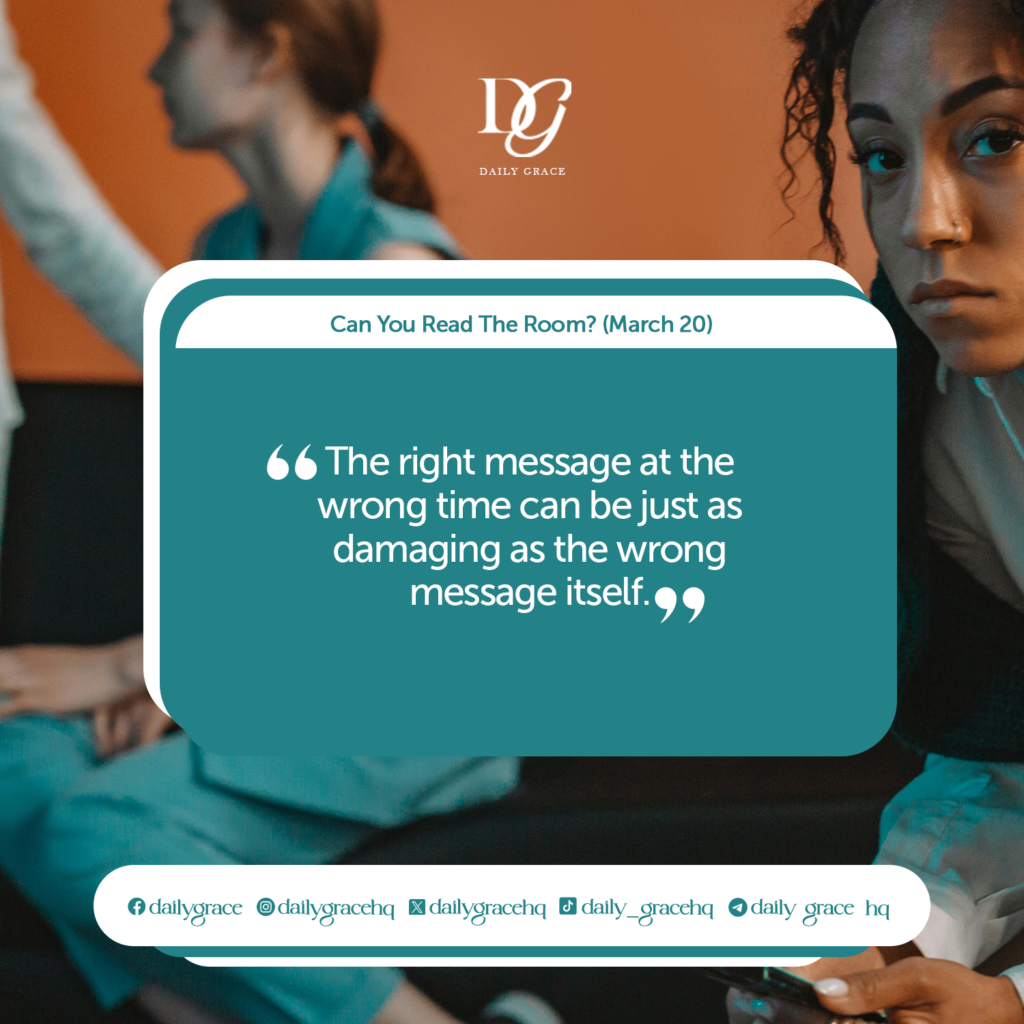Inspiring Change Every Day with Grace
Can You Read the Room?

Ever walked into a room and instantly felt tension in the air, even though no one said a word? Or tried cracking a joke that landed flat because the mood wasn’t right?
Back in university, I remember walking into my room and immediately sensing a heavy, cold tension in the air. No one said a word, but the silence was deafening. My roommates were there, each pretending to be engrossed in something; one scrolling mindlessly on her phone, another staring blankly at her laptop screen.
No laughter, no casual chatter, just an unspoken weight hanging between them. Instantly, I knew something was off. Either there had been an argument, or someone had done something to irritate the other. No one needed to tell me; the atmosphere spoke louder than words.
That’s the power of emotional awareness or the lack of it. It dictates how well we respond to unspoken cues, navigate conversations and avoid social missteps that can cost us our relationships, opportunities, or respect.
Imagine being at a networking event. Eager to make an impression, you jump into conversations about your works with loud laughter. You meet a group that just came from a stressful meeting, but you don’t notice it.
Their body language; the folded arms, short responses and lack of eye contact scream disengagement. Oblivious to the shift, you keep going, thinking perhaps you are just not clicking with them. But in reality, you are failing to read the emotional cues in the room.
Social awareness is a core part of emotional intelligence, it is the ability to perceive and understand emotions in different settings. It’s about picking up on micro-expressions, tone shifts, body language, and the energy of a space before you speak or act.
A lot of communication is non-verbal, meaning that what people don’t say often carries more weight than what they do. If you’re not paying attention to those subtle signals, you’re missing half the conversation.
For example, let’s say you’re at a friend’s birthday party and notice someone sitting alone, arms crossed, eyes darting toward the door. Instead of assuming they’re unfriendly, you recognise that they might be anxious or uncomfortable.
A simple, “Hey, how are you finding the party?” instead of forcing them into a high-energy conversation can make all the difference. The same principle applies in professional settings.
If your boss walks into a meeting with a tense jaw and clipped tone, that’s probably not the moment to pitch your big idea. Timing is everything, and those who master social awareness understand that the right message at the wrong time is just as ineffective as the wrong message.
To sharpen this skill, you need to observe before you engage. Scan the room, listen more than you speak, and assess the overall mood. If people are leaning in and animated, they’re engaged; if they’re fidgeting or offering short answers, they might be uninterested or uncomfortable.
Second, match the energy, not in a fake way, but in a way that shows emotional sensitivity. You wouldn’t bring up a serious discussion at a party or crack jokes at a funeral, right?
Lastly, practice empathy. When you start seeing conversations as emotional exchanges rather than just words, you’ll begin to understand not just what people say, but what they mean.
Reading the room is an art, and those who master it move through life with an effortless social advantage. It can make the difference between being the person everyone enjoys talking to and the one people avoid.
It’s not about being manipulative, it’s about being emotionally present, being the person who truly sees and understands others.
No Copyright infringement intended.
Have you ever misread a room or situation and later realized you got it all wrong? What happened?
Use the this link to share your story and experience anonymously https://gdpd.xyz/dailygrace
PS: Kindly Follow our WhatsApp Channel at https://whatsapp.com/channel/0029VawUlQGBPzjQXzs6fX2Q for more engaging content.

